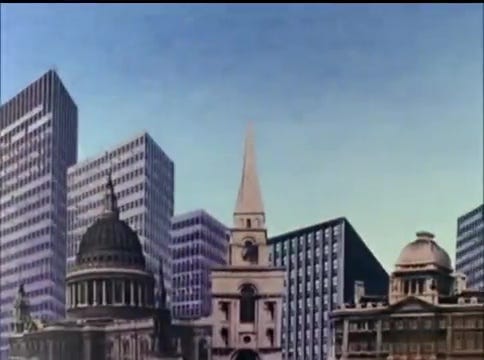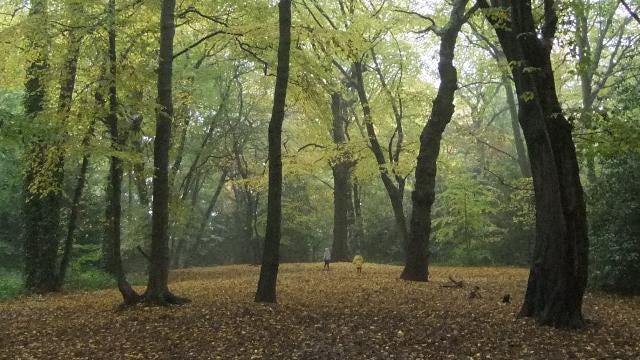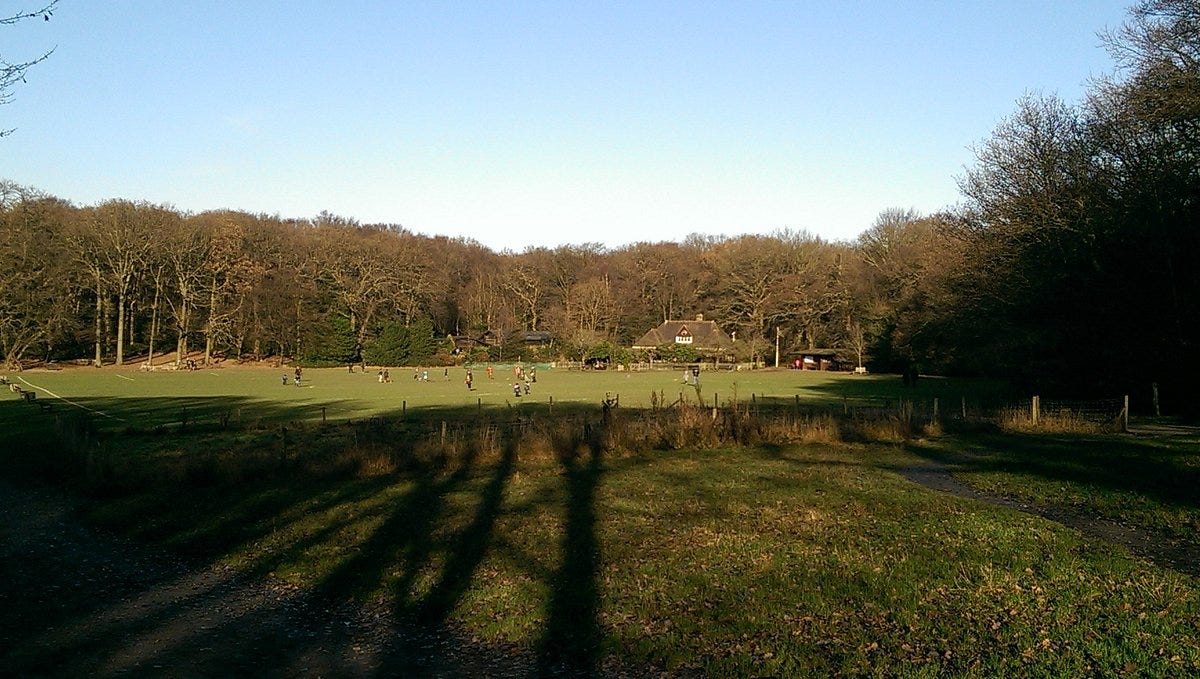The term 'psychogeography' was coined by Guy Debord in the 1950s, who defined it as: “the study of the precise laws and specific effects of the geographical environment, consciously organized or not, on the emotions and behavior of individuals.” Debord's tongue may have been positioned somewhere in his cheek, because there is very little that could be called 'precise' in any discussion of psychogeography. Despite its academic-sounding name, psychogeography is not a field of study, and has no methodology. Psychogeography is a 'vibe', and one which very quickly became absorbed back into the 'society of the spectacle' that Debord himself critiqued. Darlings of London's literary scene like Peter Ackroyd, Will Self, and Iain Sinclair adopted psychogeography, with varying degrees of success; Ackroyd is fairly readable, Self is often pretentious but gets a pass because he was quite funny on Shooting Stars, but Sinclair descends into Pseud's Corner territory with depressing regularity. For example, take a gander at this quote from Sinclair's White Chappell, Scarlet Tracings:
“MIDSUMMER: the shortest night. The year on its side. Joblard is to marry. To make that act, that avowal: St Bartholomew-the-Great. The Chemical Wedding, sponsus and sponsa, merging in song, twisting around the columns of that stone forest; celebrated here in the blending of russian [sic] stout, nigredo, with dry blackthorn cider. The risks crowd us, cackle; magpies at the window.”
Sinclair's books are full of this sort of prose; personally, reading it gives me a similar reaction as would downing several pints of 'russian stout with dry blackthorn cider' on an empty stomach. I was going to go on to DESTROY Sinclair, and quote his latest book in which he describes finding himself “in a snaking queue for covid vaccination”, but let's be honest; the whole Luke Dodson takes down yet another 20th century cultural icon for being a vax-tard!! schtick is getting a bit hackneyed by now, isn't it?1
In any case, the real reason I'm bringing up psychogeography, aside from my perpetual weakness for jaded 1990s nostalgia trips, is that I have been indulging in a bit of it myself lately. The general trajectory of my adult life has generally led me further and further away from London; lately, circumstances have been bringing me back to my home city with increasing regularity, catalysing an internal process of re-familiarising myself with a place that, as a child, I never seriously imagined I would leave.
“Ankh-Morpork! Pearl of cities! This is not a completely accurate description, of course — it was not round and shiny — but even its worst enemies would agree that if you had to liken Ankh-Morpork to anything, then it might as well be a piece of rubbish covered with the diseased secretions of a dying mollusc.” - Terry Pratchett
There's a strange revisionist version of the history of London, in which the Phoenician traders who (supposedly) established an outpost on the banks of the Thames are the spiritual (and/or physical) ancestors of the bankers who founded the Bank of England in 1694 and effectively created the global financial system as we now know it. In this view, London was always cursed, a blight on the earth, a bastion of what Herman Hesse called the “vampires of finance.”
I haven't investigated these claims, so I can't speak for their credibility, but it may have some merit, even if only on a symbolic or metaphorical level. Many of the roots of the global financial system can be traced back to London; as such, many of the roots of what we now classify as 'evil' can also be traced back to the Pearl of Cities.
Even so, it was still my home for the first nearly-two decades of my life, nexus of the globalist cabal or not. Walking through the pleasant suburbs and parks of North London produces a poignant sense of nostalgia – not just for the place I grew up, but the place in time.
This is what the Anglo-psychogeographers attempt to capture, and generally miss, because for all their 'Londonostalgia', their view of history is essentially progressive. They bemoan the loss of London's native Cockney culture and the lack of affordable social housing, but would turn paler than a Twitch streamer if you brought up the fact that mass immigration is largely responsible for both of those issues. Art which deals with nostalgia, and the haunting nature of the past, can only be permitted in certain approved channels.
A peculiar quirk of London and the South-east that often takes people by surprise is that there are more trees in this region than in much of the rest of the country, even rural areas. Part of the reason for that is that the aristocracy kept large areas aside as hunting grounds, or 'forests' (the original meaning of the term, before it became simply another word for 'woodland'). One of these, the Forest of Middlesex, covered much of what is now Greater London, Essex, and Hertfordshire.
Only a few patches remain, and one of them is Highgate Wood, 70 acres of ancient broadleaf woodland in North London. This woodland was where I developed my lifelong admiration for the oak tree, as it contains many beautiful and impressively old specimens, as well as being where I first played the game of ‘log wrestling’ with my older brother (last one on the log wins). Take out the modern paths, conveniences, and dog-walkers, and you could very easily imagine bumping into Tom Bombadil.
The cafe in the middle of Highgate Wood was known as Oshobasho Cafe from 1990 until 2004, shortly before we moved out of the area. The cafe's owner was a follower of Osho, Basho Dunsford, who had taken his name from the Japanese Zen poet; he had decorated the cafe with illustrated Basho poems (“Ancient pond – frog jumps in – plop!” being one that I remember vividly). Shortly after 9/11, there was an anti-war gathering at Oshobasho, which I attended with my mum and my brother; I remember feeling a bit embarrassed when everyone started chanting 'Halleluia' to the tune of Pachelbel's Canon, but with hindsight at least it wasn't the Leonard Cohen song.2
Say what you will about all of this; now it just seems like an echo of a London that is long gone. That something as eccentric as Oshobasho Cafe once occupied a prominent space in one of the bougiest parts of London seems astonishing now.
Contained in the word 'psychogeography' is the word 'psyche' – which originally meant soul. Psychogeography, therefore, is charting the soul of a place. I suspect this is partly why certain psychogeographers end up chasing their own tales: because to properly admit the presence of soul would risk damaging their intellectual credibility within a bourgeois subculture that scorns the notion, along with all who take it seriously.
During a recent conversation with Greg Moffitt, we spoke about the songlines of the Australian Aborigines, pilgrimage routes punctuated by bardic recitals of ancestral myth related to the stops on the route. The songline connects the participant to a realm beyond linear time; as the 4th century Neoplatonist Sallustius put it, myths “never happened, but always are.”
A psychogeographical sojourn in the modern age, however, is in many cases a literal nostalgia trip, as we can see from my own meanderings; unlike the songline, which punctures through to a world that never changes, the nostalgia trip brings the changefulness of modernity into sharp relief. Today, I would imagine that walking many Australian songlines would be coloured by the latter experience, with a landscape scarred as it is by industrial progress.
London in 2024 is simultaneously more expensive and more like a slum than at any time since the 1980s. The counter-intuitive paradox of a civilization in its twilight years is that everything is falling apart, but everything seems to be getting bigger at the same time. New apartment blocks are continuously being constructed out of cheaply-sourced materials, probably intended to be the 'pods' we're all supposed to be living in by the year 2030, according to Schwab & Co. A recent visitor to London, Christopher Rufo, described it thusly:
“The buildings, avenues, and palaces look the same as before; there is still a parliament, a king, and the pound. But the central city feels hollowed out. The old connection between citizen and nation has been altered. The old bonds of culture have been frayed.”
Is modernity a feature of the present, or is it a phase that all civilizations pass through before they collapse? Oswald Spengler notes that certain features we would now associate with the 'Great Reset' appeared in previous civilizational cycles – such as rule by a shadowy, oligarchic elite who use official representatives as puppets, or people being crammed into poorly built apartment blocks. However, not all civilizations have such a bizarre relationship to their own history as does the West. We are in constant revolution against our past, and yet we are perhaps the most diligent in reconstructing it. Who else would tear down beautiful buildings simply because they're old, while elsewhere lovingly rebuilding villages in the Iron Age style? Not that I'm complaining about the latter, as I think the historical recreation movement will prove to be a vital resource in a post-industrial future, but the irony is striking. There are, I'm told, traditional Japanese Shinto temples that have been taken down and rebuilt regularly for centuries; we, on the other hand, preserve our abandoned temples as ruins.
Earlier this summer, as I sat on the grass in the central clearing of Highgate Wood, I wondered aloud what the place might look like in five hundred years. Who knows what buildings will be standing from the old city? Who knows what language will be spoken in whatever replaces London? We'll be damned lucky if it's any relative of English, if things carry on the way they're going.
So here's to damned luck, and to the old oaks of Highgate Wood; may their children and grandchildren grow as tall and majestic as they are today.
There's a geographical pun in there intended as a peace offering for any Sinclair fans who might be reading.
Personally, I only like the Leonard Cohen songs where he admits to working for the CIA.









Yes, what will London be 500 years on? One of Shelley's friends, Horace Smith wrote a poem to compete against Shelley's "Ozymandias" in a 'friendly competition'. Smith was a stockbroker who became very rich, lived to a ripe old age in the bosom of his family in Tunbridge Wells, and who wrote ca. 20 novels, etc. I like his poem better than Shelley's, imagining London in the far off future as a wilderness:
WB Shelley (whose wife created the Frankenstein story):
I met a traveller from an antique land
Who said: "Two vast and trunkless legs of stone
Stand in the desert. Near them, on the sand,
Half sunk, a shattered visage lies, whose frown,
And wrinkled lip, and sneer of cold command,
Tell that its sculptor well those passions read
Which yet survive, stamped on these lifeless things,
The hand that mocked them and the heart that fed:
And on the pedestal these words appear"
'My name is Ozymandias, king of kings:
Look on my works, ye Mighty, and despair!'
Nothing beside remains. Round the decay
Of that colossal wreck, boundless and bare
The lone and level sands stretch far away."
Horace Smith wrote this:
In Egypt's sandy silence, all alone,
Stands a gigantic Leg, which far off throws
The only shadow that the desert knows:-
"I am great OZYMANDIAS," saith the stone,
"The King Of Kings; this mighty City shows
The wonders of my hand." - The City's gone,-
Nought but the Leg remaining to disclose
The site of this forgotten Babylon.
We wonder, - and some Hunter may express
Wonder like ours, when thro' the wilderness
Where London stood, holding the Wolf in chace,
He meets some fragment huge, and stops to guess
What powerful but unrecorded race
Once dwelt in that annihilated place.
I'm a little behind on my reading. The place Guy Debord ending up living was in Middle-Of-Nowhere-Auvergne. I think it is not far from the schoolhouse in "Avoir et Etre". The schoolteacher sued the director. Is this psychogeography?